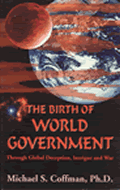Other Carle Articles:
Government
Religion In The
United States
The
Chamber Of Commerce:
It's Power And Goals
Control The Environment To Control Humanity
Universal Brotherhood And The Drive For World Unity
Von MISES WENT TOO FAR!
Erica
Carle
October 13, 2007
NewsWithViews.com
All truth is safe and nothing else is safe; and he who keeps back the truth, or withholds it from men, from motives of expediency, is either a coward or a criminal or both. --F. Max Muller
It is no surprise that a few visitors to NewsWithViews.com did not appreciate my recent article on Ludwig von Mises. Some conservatives fear that any disagreement with Mises represents a surrender to modern day socialists and liberals. I do not agree. The following two paragraphs of an E-Mail from a university professor of statistics and economics did, however, present some challenging thoughts. He wrote:
�Mrs. Carle, I really had a hard time getting through this article. I started to just quit reading almost immediately when you made it obvious that you do not even know the difference between a "classical liberal" and a modern day liberal. Thomas Jefferson was a classical liberal which, in those days, meant the opposite of what it does today. Classical liberals were the laissez faire, small, very limited government crowd. So what happened? Simple, the socialists stole the term.
�I hit another serious obstacle when you then proceeded to reveal a complete ignorance of "praxeology." You might find help [here]. There you will find that the method actually pre-dates von Mises by several centuries. In fact, it goes all the way back to Plato and Aristotle. I do hope you are not trying to put yourself into the same category with those folks.�
Dear Professor: Thank you for your message and the interesting web site recommended. Of course you really must know that I am fully aware of what Ludwig von Mises meant when he described himself as a �liberal.� As for lack of understanding of the word, �praxeology�, I don�t recall ever having used it except in quoting Ludwig. But I don�t like the word. I think I will spend the rest of my life not using it.
When you write that you hope I am not trying to put myself into the same category as Plato and Aristotle, did you mean I am not allowed to form my own opinion of what they wrote? I have no opinion on Aristotle, but I do have definite opinions about Plato�s Dialogues. One should be very alert when reading them because he represents Socrates as an admitted liar, and as sanctioning falsehood by the rulers of a state.
And Socrates did pull a fast one in MENO when he tried to prove that the slave boy had inborn knowledge. Socrates actually showed the boy the answer to the problem by obvious diagrams which anyone could understand and agree to. He was teaching by pictures while denying that he was teaching at all. This makes me suspect that Socrates was a deceiver who probably deserved his fate.
As for Ludwig von Mises, I never needed him to convince me that private property was important, or to point out what types of government activities threaten property, prosperity, peace, and freedom. I went along with those who praised Mises because he seemed, from their reports, to support the things I believed in. I suspect many others, without reading his books, consider him their not-to-be-questioned ally for the same reason.
Then a friend gave me a copy of Human Action. I also obtained a copy of The Free and Prosperous Commonwealth. Von Mises did make a good case for private ownership of the means of production, for commercial freedom and against communism and socialism. Give him credit for that. But he went too far. For one thing, he imagined world peace would result if we could realize total freedom for anyone to reside anywhere, leaving citizenship with no real practical meaning. In Human Action he wrote the following about unrestricted internationalism:
�Imagine a world in which everybody were free to live and work as entrepreneur or as employee where he wanted and how he chose . . . Imagine a world in which the principle of private ownership of the means of production is fully realized, in which there are no institutions hindering the mobility of capital, labor, and commodities, in which the laws, the courts, and the administrative officers do not discriminate against any individual or groups of individuals, whether native or alien. Imagine a state of affairs in which governments are devoted exclusively to the task of protecting the individual�s life, health, and property against violent and fraudulent aggression. In such a world frontiers are drawn on the maps, but they do not hinder anybody from the pursuit of what he thinks will make him more prosperous. . .Conquest does not pay and war becomes obsolete.� P. 684-5
I believe Ludwig should have left the creation of imaginary situations to the writers of fiction. He should have faced the world as it really was. Unrestricted mobility of capital, labor, and commodities is now causing internal distress in many countries. The United States and many other Governments are not protecting the life, health, and property of their own citizens. Even their freedom of speech, religion and association is jeopardized by heavy handed enforcement of multiculturalism and internationalism.
William T. Ellis was a reporter at the front lines during WW1. He wrote in a letter to his newly-enlisted son about internationalism as he really saw it The letter was published in 1917 in THE OUTLOOK. The following is from the section which discusses internationalism.
�My Dear Son:. . . Perhaps, recalling the many speeches you have heard me make upon America�s duty to the whole world and the perils of our provincialism, you will think it strange that I put first the danger to civilization from the current �internationalism.� I can imagine what your radical young professor of social sciences would say to my indictment! But he lives in a world of books, and I have just come out of Russia. He knows the theory; I know the thing. And this cult of �internationalism,� which is sweeping sentimentalists in many lands away from whatever moorings they once had is bluntly a worse menace to the whole world�s welfare than Prussianism itself.
�It is an attempt to reduce all integers to ciphers and then add them up and find the sum of perfection.
�It hopes to make everybody a nobody, and then suddenly produce the perfect man and the perfect state.
�Do you remember that passage in one of Stevenson�s essays wherein he describes the thrifty Scotch grocer who, at a sale bought a job lot of odds and ends of liquors and then poured them into a common vat. When asked what he was making, he replied that he did not rightly know, but he thought it would turn out port!. So your �internationalists� think they can mix good and bad, ripe and green, black and yellow, white and brown, old and new, educated and ignorant, and out of all this queer commingling get a newer, higher order of being!
�It was in Russia, which is fairly rotten with this specious idea, that I came to see clearly that �internationalism� is fundamentally a vast disloyalty. It breaks old allegiances and offers none that are new or better. For up to date the only way a man can be loyal to the race as a whole is by loyalty to that section of it of which he is a part. . . If certain of our present-day reformers would give over trying to transform the universe and confine themselves to effecting some substantial improvement in that infintesimal fragment of it which lives within their own clothes, they would have a task more commensurate with their powers and likelier to promote the general result desired.
�Internationalism� as I noticed it in Russia was, wittingly or unwittingly, only a cloak for mental and moral laziness. It meant a repudiation of clear and tangible and undoubted obligations to the people of the country and to its national allies. These poor dreamers acted as if they thought that they could build up humanity by wrecking Russia. If I am not mistaken, it will yet prove the greatest disservice ever done by one nation to the whole world. While it may be only the mist that precedes the sunrise, I very much fear that is a fog of death.
�So for you, my boy, I prescribe patriotism--passionate, pulsing, purposeful patriotism. Be sure that every atom you contribute to the well-being of America is the most direct service you can render the the human race as a whole. Every brick built into her walls is like a foundation stone for the entire world. Whatever you do to help your country to fulfill her highest destiny is the straightest contribution you can make to the well-being of mankind. And any act of recreancy to America is black disloyalty to all the little peoples and weak peoples who are leaning upon her for support and guidance. As one who has traveled over more of this earth�s surface than most men, I solemnly declare to you, my son, that the best internationalist today is the true American. . .
Yours in an eternal bond of love. DADDY�
Well Professor, and others, that�s it for now. Since I had the audacity to write what I did about Socrates, why should I hesitate to agree with William T. Ellis and disagree in some respects with Ludwig von Mises?
GOD BLESS AMERICA!
� 2007 Erica Carle - All Rights Reserved
Erica Carle is an independent researcher and writer. She has a B.S. degree from the University of Wisconsin. She has been involved in radio and television writing and production, and has also taught math and composition at the private school her children attended in Brookfield, Wisconsin. For ten years she wrote a weekly column, "Truth In Education" for WISCONSIN REPORT, and served as Education Editor for that publication.
Her books are GIVE US THE YOUNG--$5 Plus $2.00 P&H WHY THINGS ARE THE WAY THEY ARE--$16 PLUS $4.00 P&H BOTH BOOKS -- $25 Total. A loose leaf collection of quotes titled, SIX GENERATIONS TO SERFDOM is also available--$15 Plus $2.00 P&H. Mailing address: Erica Carle; PO Box 261; Elm Grove, WI 53122.
E-mail: ericacarle@sbcglobal.net
As for Ludwig von Mises, I never needed him to convince me that private property was important, or to point out what types of government activities threaten property, prosperity, peace, and freedom.











